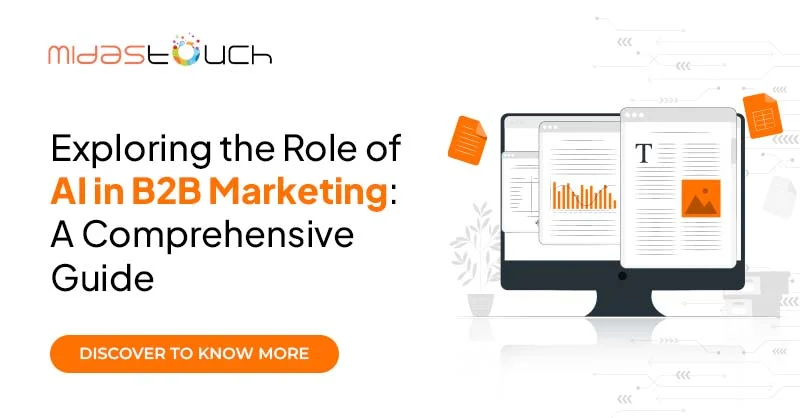
There’s always a need for fresh and interesting content. Bloggers and writers are constantly trying to create content that keeps their audience interested, all while juggling many other tasks.
This can be exhausting and sometimes leads to either feeling burned out or producing lower-quality content.
That’s where artificial intelligence (AI) comes in. It’s a groundbreaking tool that offers to help ease some of these pressures by taking care of repetitive tasks and helping writers manage their workload more effectively.
But the big question is: Can AI really write like a B2B copywriter?
This blog takes a journey into the world of AI-powered B2B marketing. We’ll explore situations to see if AI lives up to its promises in the digital marketing world. You’ll discover where AI excels and where it might struggle.
Let’s dive right in.
AI For Content Writing
AI-driven writing tools such as ChatGPT, Bard, and similar platforms are gaining popularity among bloggers and content creators, and there’s a good reason for it.
AI technology can assist you in creating good content fast and effectively, while also offering useful insights into what your audience likes and how they behave.
Many believe AI is revolutionizing the copywriting industry. But does this hold true in the realm of B2B tech marketing, or is it merely hype? Can ChatGPT really write a how-to guide effectively?
To answer this, let us first look into the benefits of using AI is B2B marketing.
How is AI being Used In B2B Marketing?
Dismissing AI’s potential and ongoing improvements would be unwise for a digital marketer. AI excels at offering quick, useful, and valuable information.
For example, if you ask ChatGPT for “blog ideas for best AI tools for B2B marketing,” within seconds, it’ll suggest titles like “Maximizing Lead Generation with AI Tools in B2B Marketing” and “5 Must-Have AI Tools for an Effective B2B Marketing Strategy.”
This demonstrates how AI can spark creativity in content creators by providing fresh ideas and assisting in structuring blog posts.
Artificial intelligence tools give B2B digital marketers five key pieces of information:
- Customer insights: Helping to understand and group customers better.
- Content insights: Assisting in making relevant and top-notch content.
- Campaign insights: Improving marketing plans.
- Predictive insights: Predicting trends, behaviors, and changes in the market.
- Competitive insights: Finding new approaches for markets that haven’t been explored yet.
By using AI, digital professionals can keep up with trends, adjust plans, and connect well with the people they’re aiming for.
But where does AI fall short?
Limitations Of Using AI
AI-generated content has the following drawbacks.
- Data from artificial intelligence isn’t always entirely accurate.
- Free tools sometimes fabricate details instead of acknowledging limitations.
- Content produced by AI can sometimes be disappointingly generic. It may lack the personal touch and struggle to resonate with certain human readers.
- Additionally, AI-generated content might not consistently match your brand’s tone and message.
The point is that if you publish AI-generated content that’s inaccurate through automated campaigns, you risk sharing low-quality and irrelevant information that lacks authenticity. These problems can harm your brand’s reputation, SEO rankings, customer loyalty, and trust if not addressed.
Can AI Write Like A B2B Copywriter?
Even though AI and writing tools simplify tasks, digital marketers remain unsure about relying on AI for complex and technical subjects. B2B marketing involves many industry-specific details.
Creating a how-to guide is actually quite challenging for two main reasons:
- They need to be written in a way that’s really easy to understand.
- They have to contain accurate and current information to guide users effectively along the path they’re trying to follow.
AI doesn’t possess a thorough grasp of the sector, its trends, or the distinct challenges faced by various businesses. AI may appear intelligent, and in numerous aspects, it is. However, AI falls short when it comes to human creativity, judgment, and strategic thinking.
Therefore, human involvement remains essential for understanding and acting upon the insights provided by AI.
FAQs: Exploring The Role of AI in B2B Marketing
How does AI help in B2B?
AI does many things in B2B sales, like improving marketing plans and making things more personal, automating tasks, and giving insights about what might happen in the future.
Is it fine to write with AI?
It’s alright to use an AI for content writing, but some ethical worries come with it. These include the risk of plagiarism and the possibility of making original content less valuable.
Is ChatGPT safe to use for copywriting?
Usually, ChatGPT and similar language models are pretty good at creating text that sounds like it’s written by a human. However, it’s important to know that these models aren’t perfect and might sometimes give wrong, biased, or troublesome results.
Conclusion
So, should you take advantage of AI tools? You absolutely should! However, if you’re in charge of a B2B company, it’s essential to realize that you have a ton of data related to your projects, operations, workflows, and so on, available to you.
Even though AI can’t replace human B2B marketers entirely, it can be a valuable tool for those who know how to use it well.
So, make sure you complement your creativity and strategic thinking with AI but always double-check its findings to ensure accuracy.
